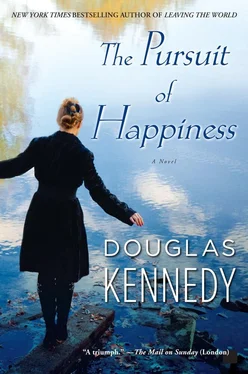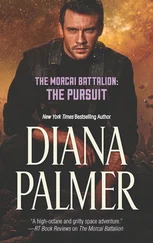Without hesitating, I said, 'Fine'.
'I have your word?'
'You have my word'.
Silence. She reached into her handbag and pulled out a little notebook and a pen. She wrote a name and a number on a leaf of paper, then tore it out and handed it to me.
'This is the phone number for my lawyer. You can talk to him about setting up the trust'.
'I'll get on to it tomorrow morning'.
Silence. Then she said, 'You know what I think sometimes? How if he hadn't run into you again that afternoon in Central Park... I remember that afternoon so clearly. We were out walking. He was tired. He wanted to go home. But it was such a beautiful day I insisted we stop by the gazebo next to the lake. Suddenly, there you were... and everything changed. All because I asked him to loiter for a bit by the lake'.
'It's the way things work, isn't it? Chance, happenstance...'
'And choice. Things might happen accidentally - like me getting pregnant, or you meeting an old lover and his family in the park. But then we make choices. That's what we have to live with: not the accident, the fluke - but the choices we make in the wake of it. Because they really determine our destiny'.
She glanced at her watch. 'I must go'.
She stood up. I did so too.
'Goodbye then', I said.
'Goodbye', she said.
Then she quickly touched my sleeve and said two words: 'Thank you'.
I never saw her again. I never spoke with her again. I never came near her children. I honored the conditions she demanded. I kept my word.
Until she died.
Part Four
Kate
One
'UNTIL SHE DIED'.
The manuscript ended there. I held the last page in my hand, staring down at that final line. After a moment, I let it drop on to the hefty pile of pages scattered on the floor by the sofa. I sat back. I gazed blankly out the window, trying to think, not knowing what to think. Dawn's early light was cleaving the dark sky. I glanced at my watch. Six fifteen. I had been reading all night.
Eventually, I forced myself to stand up. I walked into the bedroom. I stripped off my clothes. I stood under a shower for a very long time. I got dressed. I made coffee. While it percolated, I gathered up the manuscript pages and returned them to the box in which they came. I drank the coffee. I picked up my coat and the manuscript box. I left the apartment. The doorman hailed me a taxi. I told the driver I was heading to 42nd Street and First Avenue. As we cruised downtown, I turned on my cellphone and made a call. Meg answered, her 'Hello' accompanied by a bronchial wheeze.
'I'm coming over', I said. 'Now'.
'What the hell time is it?' she said.
'Just after seven'.
'Jesus Christ. Has something happened?'
'Yes. I've been up all night. Reading'.
'Reading what?'
'I think you know'.
Silence. I broke it. 'Just as I think you know where I was yesterday evening'.
'Haven't a clue', she said.
'Liar'.
'I've been called worse. Should I put on a flame-retardant dress before you get here?'
'Yes', I said, and hung up.
She was actually dressed in a pair of men's pajamas and an old bathrobe when I arrived. The requisite two cigarettes were already burning in an ashtray. The television was tuned to CNN, the volume far too loud. As always, there was a pile of books and periodicals by an armchair. The remnants of a recent supper - a half-eaten Chinese take-out - had yet to be cleared off the little table that doubled as a desk and dining area. The apartment was the same as I'd always known it all my life. It was just as Sara must have seen it - when she came here on the night of my father's funeral in 1956.
'I'm never talking to you again', I said, as I walked in and tossed the manuscript box on her sofa.
'Glad to hear it', she said, clicking off the television. 'Coffee or coffee?'
'Coffee. And an explanation'.
'For what?' she asked, pouring me a cup from her old electric percolator.
'Don't go coy on me, Meg. It doesn't suit you'.
'And there I was, thinking that I might try "coy" for Christmas'.
'Quite a book', I said, nodding towards the manuscript box. 'I presume you've read it?'
'Yes', she said. 'I've read it'.
'She didn't hire you as her editor, did she?'
'I read it as a friend'.
'Oh yes, I forgot. You and Mystery Woman just happened to have been bosom buddies for the last four decades. And now I suppose you're going to help her get her book published?'
'She doesn't want it published. She wrote it for herself'.
'Then why did she want me to read it?'
'It's part of your life. You needed to know'.
'I needed to know now? Right after my mother's funeral?'
She just shrugged and said nothing. I said, 'You should have told me, Meg. You should have told me everything years ago'. 'You're right, I should have. But Dorothy was very insistent. Because she made it very clear that she wouldn't touch the trust if either of you found out'.
'She should never have touched the trust'.
'If she hadn't, you would never have had that fancy private school education of yours...'
'Big deal'.
'It was a big deal... and you know it. Because it took a lot of guts for Dorothy to do what she did. Jesus, imagine it: having to rely on money from your late husband's lover to get your kids through school'.
'But I thought Uncle Ray paid for our school and college'.
'Ray never gave your mom a dime. He was the original WASP tightwad. No kids, a big white-shoe practice in Boston, an even bigger bank account. But when his sister and her husband were in dire straits - after Jack lost his job at Steele and Sherwood - Ray pleaded poverty. Even when Jack was dying at Mass General, that asshole didn't once pay him a visit... even though the hospital was only a ten-minute walk from his Beacon Hill townhouse. Worse yet, he didn't exactly spend a lot of time comforting his sister during that time. One lunch on the afternoon before Jack died, during which he told his sister that she should never have married "that Brooklyn mick". Dorothy hardly spoke to him after that. Then again, I don't think they ever really liked each other anyway. He always disapproved of everything to do with Dorothy. Especially when it came to my brother'.
'But I was still told that Ray was my great benefactor'.
'Your mom had to find some story to tell you about the money. God knows, it sickened her to accept Sara's gift. And though she never said much about it, I know that it ate away at her. But she was the ultimate pragmatist. She couldn't afford your education on what she made as a librarian. So she was going to swallow her pride - as she always did, the fool - and do what was best for the two of you'.
'You mean, like keeping all this from me until my mid-forties?'
'She was adamant that neither of you knew. Because I think she feared what you both might think. Anyway, a week before she died, I went to see her at New York Hospital. She knew she only had a couple more days. And she asked me: "Once I'm no longer around, are you going to tell her?" I said I'd stay schtum if that's what she wanted. "It's your call," she told me. "But if you do decide she should know, let her tell Kate. It's her story as much as mine."'
'But how did she know even where Sara was?'
'From time to time, she'd ask me about her. She knew that Sara and I had become good pals, that we were in pretty regular contact. Just as she also knew that, through me, Sara was keeping tabs on you'.
'Keeping tabs on me? Judging by that photo gallery by her door, not to mention the album she sent me, she was doing a little more than that. With your help'.
'You're right. I gave her all the photographs. I supplied her with all the newspaper clippings. I kept her abreast of all that was happening to you. Because she wanted to know. Because she genuinely cared about you. And because I felt she deserved to follow your progress'.
Читать дальше












